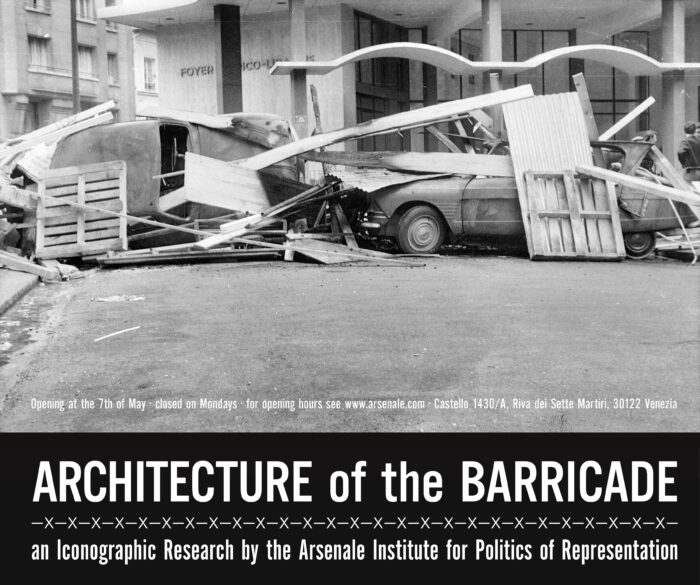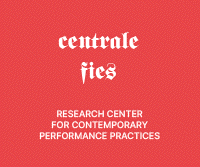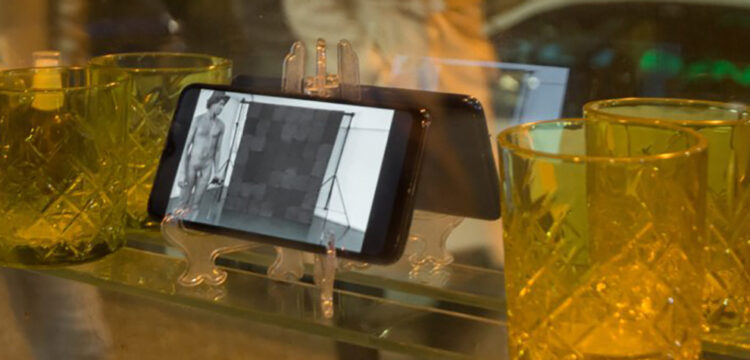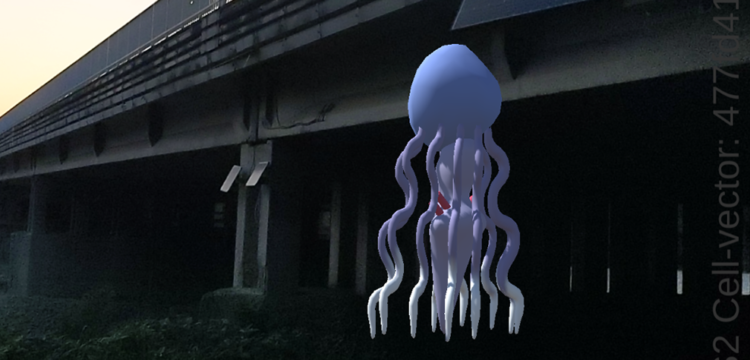The Night Falls
Latifa Laâbissi and Marcelo Evelin in conversation with Silvia Fanti
In La Nuit tombe quand elle veut (The Night falls when it wants) Latifa Laâbissi, French choreographer and performer, of Maghrebi and Indian origin, and the Brazilian choreographer Marcelo Evelin, create the conditions of an incarnate vigil: embodied by voices, songs, inhabited by flaming presences and nagging ghosts, where the body is a medium, in touch with the reality of this world. As Gilles Amalvi wrote “they weave a space of shadows and make it act.”
Silvia Fanti: La Nuit tombe quand elle veut is a collaboration that starts from the encounter between your subjectivities – personal, cultural, artistic. It crosses cultures without reaching a solution: it incorporates, hybridizes, re-mixes cosmogonies, to bring out reconfigurations. You are just “creating the conditions for” along this wake, because the Night comes when it wants. What does it mean?
Latifa Laâbissi: It simply means that we do not have control over the living and we especially do not wish to have it. This is really not a romantic posture but rather a way of being there, among the multitude of forms of life. which have their own cycles.

Silvia Fanti: The performance amplifies and incorporates images, voices, sounds, presenting both a principle of exposure and the risk of disappearance. Can we talk about a theater of archetypes and the potential that brings us closer to vulnerable figures? To what extent is it a question of rehabilitating a relationship with the phantasmatic, or the spirits?
Latifa Laâbissi: The figures that seem to make us disappear, are indeed a possibility of multiplying, our animal presence, stone, ghost presences, a projection surface for a deployment of the imaginary of the people (the audience) who watch over us.
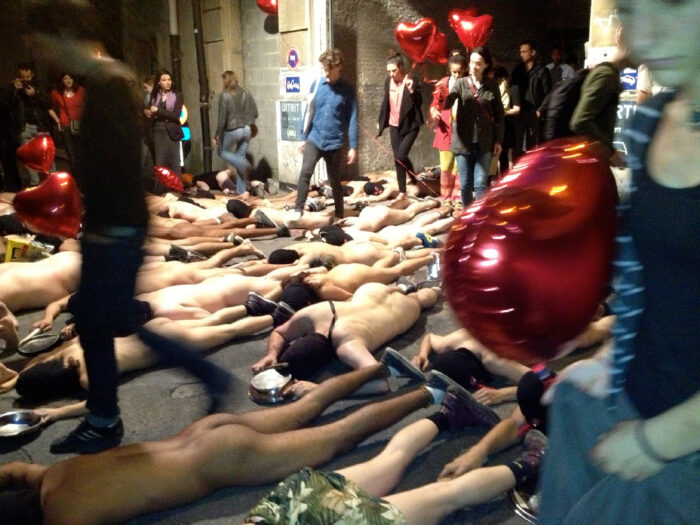
Silvia Fanti: You let your bodies be traversed by the things you (we) have seen, received, contaminate and sediment, cannibalize and bury. Could we speak of a body-landscape?
Latifa Laâbissi: Our bodies are populated by invisibles that arise or are called by us. I am also thinking of Starhawk, whom I would like to quote here: “we are each a wrinkle in the nimbus of the earth, every living thing is a dissipative structure, that is to say that it does not last in itself, but only as a result of the continual flow of energy through the system. From this point of view, the reality of individuals is problematic because they do not exist in themselves, but only as local disturbances in this universal energy flow.”
Marcelo Evelin: I don’t like the idea of the body as a landscape, something that is there to be appreciated, a form in the horizon that doesn’t necessarily affect who is watching. If I speak about contamination and cannibalism I am actually speaking about the radical transformation which the body goes through by being trespassed, a word I prefer instead of traversed.
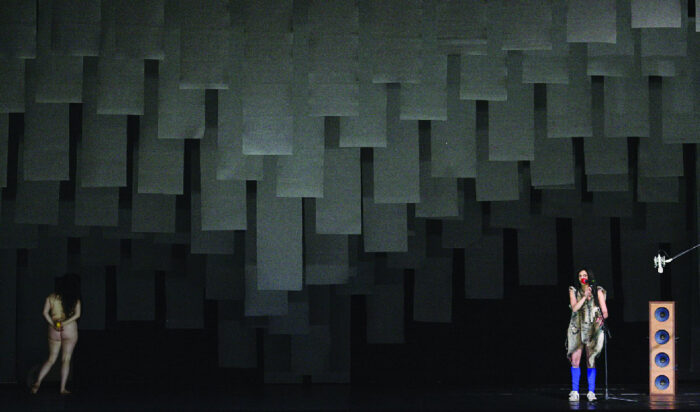
Silvia Fanti: In La Nuit.., an external voice says: “There is nothing natural”. Is it also a reflection on civilization? You incorporate other people’s voices and languages you don’t know (a glossolalia? An illusory play-back?). The theremin is also a voice .. Gilles Amalvi observed in your case a “strange intimacy with friendly ghosts”. Is it also a way to extend the concept of community?
Latifa Laâbissi: Yes it is exactly that. It is to mix the thoughts, the voices of these friendly ghosts.
Marcelo Evelin: “There is nothing natural” affirms the character of ritual and performativity we are approaching in this piece, maybe as a way to rethink civilization. (Is civilization only European, white, heterosexual and rational; or can we finally admit there is more?). The sentence comes from Pasolini, which was one of our invited ghosts. We are here more interested in inviting ghosts, invisible entities, imaginary creatures and other forms of life. It only makes sense to think community if we include all and everything, beyond our capacity to understand what could that be.
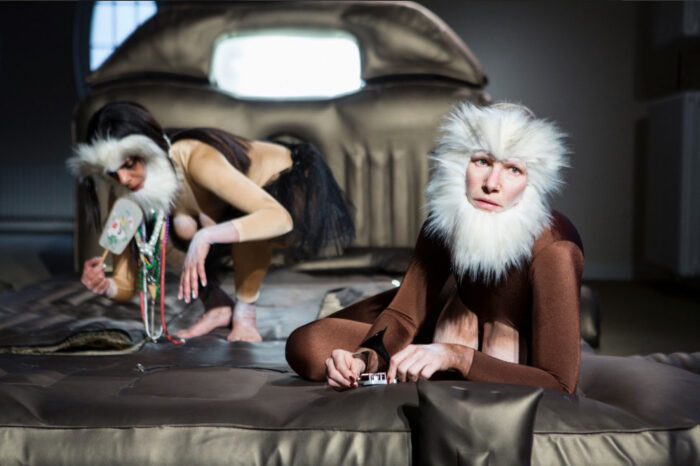
Silvia Fanti: Latifa, concerning the subject of identity, in the performance Consul and Meshie with Antonia Baehr, you adopted your own “apish identities”, inspired by two chimpanzees who at the beginning of the 20th century lived as humans among humans and ended up considering themselves as such (presented at Live Arts Week in 2018). Insolent and shameless, these two monkeys made fun of male philosophy, questioning the violence of assigning roles and categories of nature/culture, man/woman, self and the other. You have playfully performed against credited history. Does your work subtly seek to create space for the minor, against closures, stabilization, control? What do you think about it? How do you position towards what has become the topic of the day?
Latifa Laâbissi: My work ultimately always consists of finding figures, gestures, spaces, fictions that seek to dis-identify rather than the contrary, so in this sense I work among other things to un-trap assignments to make a large place for complexity, hybridization, the twisted!
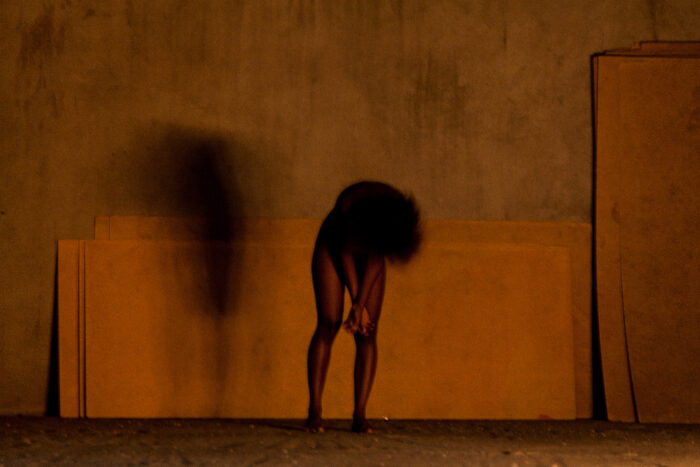
Silvia Fanti: Marcelo, in your previous work The Invention of Evilness/A Invenção da Maldade (presented in Bologna for Live Arts Week 2019), the bodies danced in a floating atmosphere and the sound was a “non-presence that passed like a fluid through the flesh. Celestial infection.” They raised the question “could this doing of the body be another form of thinking? Or is it rather a diffuse and feral act of resistance, an affirmation of something intangible and unclassifiable, which rises like waves from the outskirts of the accepted.”
It looks that you treat dance as a staging of bodies “infected by the world” and dominated by external forces. Dance for tired, fragile, or even suffering but rebellious bodies which, as bodies in motion make it viral, contagious, post-apocalyptic: if death is certain, this tumult of corporeality reaffirms life in all its power even within extreme precariousness. Can you specify your political vision?
Marcelo Evelin: I am an artist of the third world, born in the most poor and abandoned state of Brazil, gay, poor and living with a status of emigrant in Europe for 36 years. In my work I try to bring along (literally and metaphorically) all the others that, as myself, are searching for a place of dignity to survive, while keeping working as an artist.
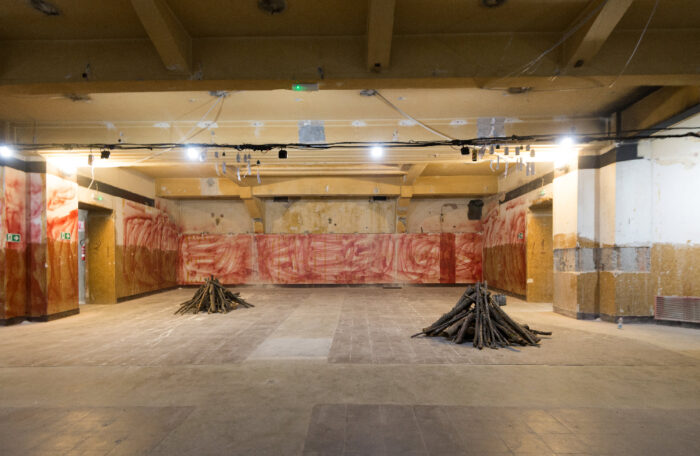
Photo by Luca Ghedini, courtesy Xing.
Silvia Fanti: You also work in theaters (recently in the context of the Festival d’Automne in Paris), in which you experimented with the reconfiguration of the performance space in a community key. Which are the most fitting places for the performance today, following your idea of an environment for sharing? Personally I feel uncomfortable in theaters, and prefer the concept of ‘field’ in which the performance could happen (or not) as agglomeration of presence, postures, actions, thoughts, images (sound and vision have the same quality). In Bologna you will perform in a Hole (44 ° 29’57.8 “N 11 ° 16’58.2” E) in a clearing among the trees, on the banks of the Reno river. At Night… waiting for visitations… Which kind of public space is possible?
Latifa Laâbissi: I can speak for my part, and of course Marcelo will answer from his experience of so-called “other” spaces which is really a place of politics. Concerning me, for more than ten years I have been inviting artists for the Extension sauvage festival, a project that invents other contexts of hospitality for artists and audiences. Making (a) place (in French “faire lieu”) is a real adventure, I don’t want to have a binary position on the subject of theater or other places. For me it is a matching between project and place, a dialectic rather than an opposition. With Marcelo, we always had the intuition during the process of La nuit… :that the exterior would take place, in the perspective of a heterotopia in Foucault’s sense, a physical location of utopia, a vigil.
Marcelo Evelin: I don’t think the question is the space: theaters, museums, river banks or fields. For me the question is the condition, which kind of condition we create to receive the audience and share something. Which kind of vibration (or sensitivity or affect-ability) we possibly create to reach a situation of being together without having to force it by giving instructions to be obeyed. I believe we are all looking for a way to restore the lost idea of common, something that maybe could reconstitute us as humanity part of a bigger world.


